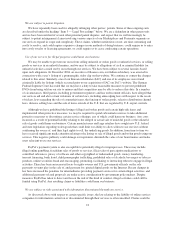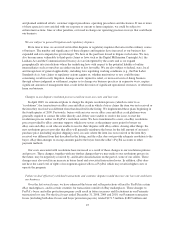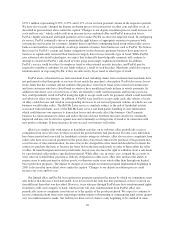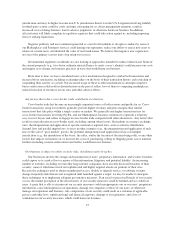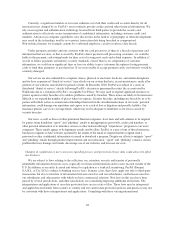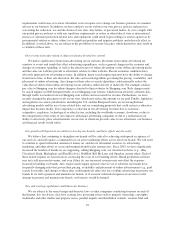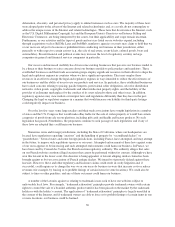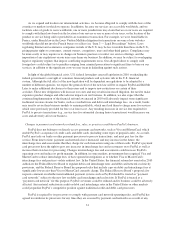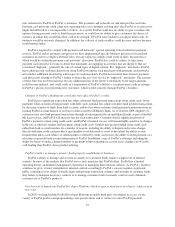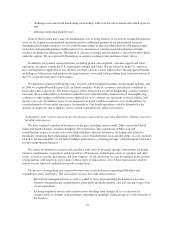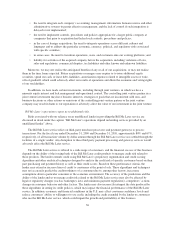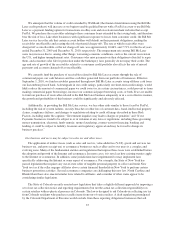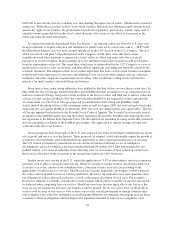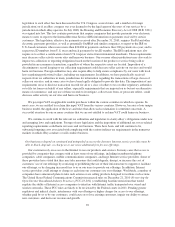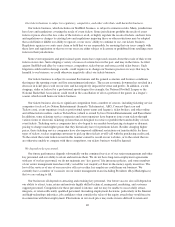eBay 2010 Annual Report Download - page 38
Download and view the complete annual report
Please find page 38 of the 2010 eBay annual report below. You can navigate through the pages in the report by either clicking on the pages listed below, or by using the keyword search tool below to find specific information within the annual report.application programming interfaces (APIs). We also began providing a software tool kit for building mobile
payments applications. In addition, we provide third party developers with access to certain APIs with respect to
our Marketplaces platforms. There is no assurance that third-party developers will develop and maintain
applications and services on PayPal’s platforms on a timely basis or at all, and a number of factors could cause
such third-party developers to curtail or stop development for our platforms. In addition, our business is subject
to many regulatory restrictions, which may be contravened by such third party applications. If this were to occur,
we would be liable for the regulatory failure and our business could be adversely affected.
System failures could harm our business.
We have experienced system failures from time to time, and any interruption in the availability of our
websites will reduce our current revenues and profits, could harm our future revenues and profits, and could
subject us to regulatory scrutiny. Our eBay.com website has been interrupted for periods of up to 22 hours. In
November 2009, technical systems issues resulted in eBay.com users being unable to search for listed items for a
period of several hours. Our PayPal website has suffered intermittent unavailability for periods as long as five
days, most recently for approximately two hours in October 2010. Other of our websites (e.g., StubHub) have
experienced intermittent unavailability from time to time. Any unscheduled interruption in our services results in
an immediate, and possibly substantial, loss of revenues. Frequent or persistent interruptions in our services
could cause current or potential users to believe that our systems are unreliable, leading them to switch to our
competitors or to avoid our sites, and could permanently harm our reputation and brands. Reliability is
particularly critical for PayPal, especially as it seeks to expand its Merchant Services business. Because PayPal is
a regulated financial institution, frequent or persistent site interruptions could lead to fines, penalties, or
mandatory changes to PayPal’s business practices, and ultimately could cause PayPal to lose existing licenses it
needs to operate or prevent it from obtaining additional licenses that it needs to expand. Finally, because our
customers may use our products for critical transactions, any system failures could result in damage to our
customers’ businesses. These customers could seek significant compensation from us for their losses. Even if
unsuccessful, this type of claim likely would be time-consuming and costly for us to address.
Although our systems have been designed around industry-standard architectures to reduce downtime in the
event of outages or catastrophic occurrences, they remain vulnerable to damage or interruption from earthquakes,
floods, fires, power loss, telecommunication failures, terrorist attacks, cyber attacks, computer viruses, computer
denial-of-service attacks, human error, hardware or software defects or malfunctions, and similar events or
disruptions. Some of our systems, including our Shopping.com website and the systems related to the Bill Me
Later business, are not fully redundant, and our disaster recovery planning is not sufficient for all eventualities.
Our systems are also subject to break-ins, sabotage, and intentional acts of vandalism. Despite any precautions
we may take, the occurrence of a natural disaster, a decision by any of our third-party hosting providers to close a
facility we use without adequate notice for financial or other reasons, or other unanticipated problems at our
hosting facilities could cause system interruptions, delays, and loss of critical data, and result in lengthy
interruptions in our services. We do not carry business interruption insurance sufficient to compensate us for
losses that may result from interruptions in our service as a result of system failures.
There are many risks associated with our international operations.
Our international expansion has been rapid and our international business, especially in Germany, Korea
and the U.K., has also become critical to our revenues and profits. Net revenues outside the U.S. accounted for
approximately 54% of our net revenues in each of the fiscal years ended December 31, 2008, 2009 and 2010.
Expansion into international markets requires management attention and resources and requires us to localize our
services to conform to local cultures, standards and policies. The commercial, Internet, and transportation
infrastructure in lesser-developed countries may make it more difficult for us to replicate our traditional
Marketplaces business model. In many countries, we compete with local companies that understand the local
market better than we do, and we may not benefit from first-to-market advantages. We may not be successful in
expanding into particular international markets or in generating revenues from foreign operations. For example,
33


